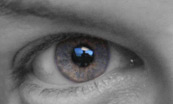Never before have I been reminded as often as I have in the past few weeks, that time is relative. It is a concept that isn't exact and as such, I assume, has been described as "an illusion".
On the one hand, there is the perception of actual time. For example, I have met this man - this beautiful soul - and when I am with him, 12 hours feel like one. It's near magical, how the perception of time changes depending on what you're doing or who you're with.
But, what I have been reminded of lately when it comes to the well-known relativity of time, is how age plays into it. I am so set into the concept of age according to the years we have on our backs, accepting the associated limits as facts, even though a lot of them are social constructs, that I have forgotten how fluid time and, more specifically, age can be.
I'm not saying ageing is an illusion. Ageing is part of life, sure. But the way we have packaged it, is very generalized and doesn't necessarily apply to everyone. I recently heard an interview with David Sinclair (on the Good Life podcast) that further expanded my understanding of the aging process. I don't know if I fully believe all theories presented by Dr. Sinclair, but some things he said really did ring true. He reminded me of the fact that we have a recorded age and a biological age, which can be determined by simple DNA testing.
I'm not sure why I have always felt old. I remember, it was right after my 24th birthday, that my thinking shifted. By the time I reached 30, I felt ancient. The discovery of my first wrinkle sealed the deal that it surely was all downhill from there.
When I look at photos from that time (around 30), I am in amazement at my skewed perception of self. I had the face of a 15-yr-old.
A couple of days ago I spoke to the guy who I had been intimate with over a few years until I cut it off last year. This sentence makes him seem like a very casual, irrelevant connection. While it was perhaps casual, it was so only for one reason: our age difference. He is 20 years younger than I am, and even though he is a lovely, incredibly mature young man who clearly loves me, I could never allow to open my heart or life to him. It was my responsibility as "his elder". 😝
He has asked me to marry him and have a child together on more than one occasion. Once more, when I told him that I had met someone (i.e. sealing the doors for good). It never was casual for him. But, as I was venting to a girlfriend of mine, our age difference wasn't going to change. Even if I would have opened myself and said yes to his proposals, there is no way he would always desire me. I will soon be "old". He may always love me, but at some point he is not going to want me anymore.
Over this statement, my friend chuckled and reminded me of the fact that age differences have nothing to do with such developments. Usually, it is just a side-effect of long term relationships. She herself was in such a situation. No big age gap, two magazine-type beautiful people, raising a lovely little family together, but struggling with the upkeep of sexual desire for each other. Just like most married couples do. It takes work and sometimes miracles to maintain the sensual and sexual element. I've been married myself before. 12 years. I know its realities. Especially with small children in the picture. It's a challenge.
Either way, my friend managed to return perspective to my skewed conviction focused solely on age. And it made me think what else I was sabotaging based on my socially conditioned opinions.
Either way, my friend managed to return perspective to my skewed conviction focused solely on age. And it made me think what else I was sabotaging based on my socially conditioned opinions.
